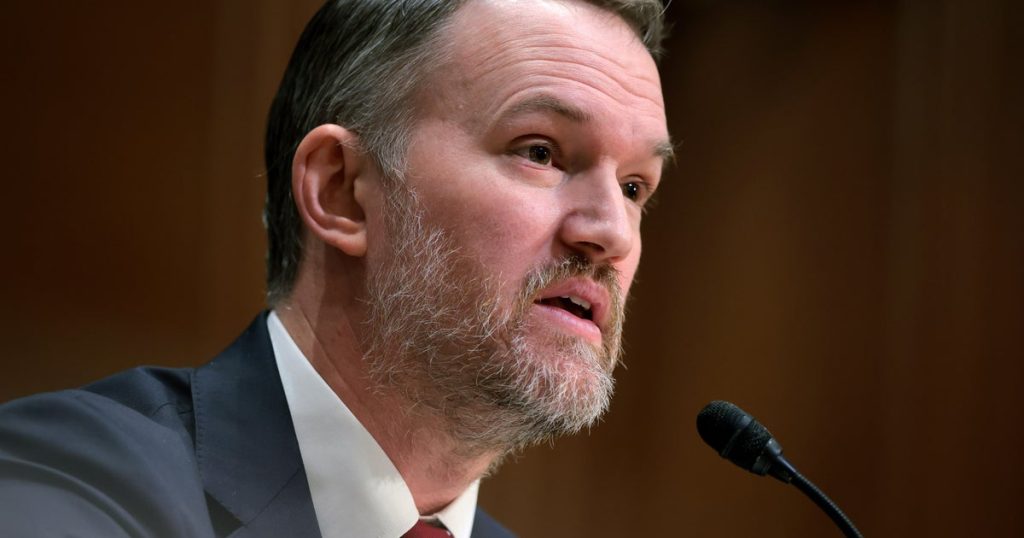In a surprising turn of events, President Trump announced a 90-day pause on his administration’s reciprocal tariffs while his trade representative, Jamieson Greer, was testifying during a House hearing on trade policy. The announcement came as a shock to Greer, who stated he learned about the pause at the same time as the public. The unexpected decision has raised questions about the administration’s trade strategy, particularly in the context of ongoing tensions with nations such as China, which faces significant tariffs of its own.
| Article Subheadings |
|---|
| 1) Announcement of Tariff Pause |
| 2) Greer’s Testimony and Reaction |
| 3) Economic Implications of the Decision |
| 4) Political Ramifications for the Administration |
| 5) Future Trade Policy Outlook |
Announcement of Tariff Pause
On Wednesday, President Trump revealed a significant pause in the implementation of planned tariffs during an impromptu announcement. This decision is designed to provide a temporary relief period within ongoing trade negotiations. The tariffs had initially been set at a 10% level on nearly all countries, with China facing an even steeper tariff of 125%. The timing of the announcement raised eyebrows, particularly due to its coinciding with trade representative Jamieson Greer’s testimony in front of the House Ways and Means Subcommittee on Trade, where Greer had no prior indication of any changes being made to the tariff plan.
Greer’s Testimony and Reaction
As Greer faced questions from legislators, most pointedly from Rep. Steven Horsford, it became clear that he had not been informed of the tariff pause before or during his testimony. When Horsford pressed Greer for details about the decision, Greer mentioned, “I understood the decision was made a few minutes ago.” This lack of communication led to a tense exchange, with Horsford emphasizing the disarray caused by the abrupt announcement, suggesting that it undermined the seriousness of the tariff negotiations being discussed.
Economic Implications of the Decision
The pause on tariffs has several implications for the U.S. economy. Following the announcement, the U.S. stock market reacted positively, showing a surge that contrasted sharply with prior declines associated with the announcement of tariffs. Analysts view this sudden shift as reflective of market anxiety over trade policies and their potential consequences on global trade relations. However, the economic community questions whether the 90-day delay is enough to affect broader trade structures, and whether it serves as a mere stop-gap without addressing the underlying issues at play.
Political Ramifications for the Administration
The unexpected tariff pause raises significant concerns about the Trump administration’s internal decision-making processes. Legislators, including Horsford, criticized the lack of coordinated strategy, suggesting that the administration operates more through reactionary measures than premeditated planning. This incident brings to light the potential vulnerabilities in Trump’s trade agenda, leading many political experts to speculate on the administration’s overall effectiveness and coherence in managing trade relations both domestically and internationally.
Future Trade Policy Outlook
Looking forward, questions linger about how the administration intends to navigate its trade policy in the coming months. The pause, while it has provided temporary relief, must be followed by a comprehensive strategy that directly addresses the trade imbalances with nations like China. Future sessions of Congress and additional hearings may reveal more details about the administration’s objectives and challenges moving forward, highlighting whether this pause will lead to productive negotiations or additional strains on U.S. businesses and consumers.
| No. | Key Points |
|---|---|
| 1 | President Trump announced a 90-day pause to planned tariffs unexpectedly during a House hearing. |
| 2 | Trade Representative Jamieson Greer was blindsided by the announcement during his testimony. |
| 3 | The market reacted positively to the pause, contrasting with its previous downturns related to tariff talks. |
| 4 | Political figures criticized the administration for its lack of clear strategy in trade policy. |
| 5 | Future discussions may clarify the administration’s direction on trade following the pause. |
Summary
The pause on tariffs announced by President Trump has raised substantial questions regarding the United States’ trade policy and the administration’s internal coordination. The immediate positive response from the stock market reflects a complex interplay between trade strategies and market sentiments. As legislators demand clarity from trade representatives, the coming weeks will likely prove critical in setting the course for U.S. trade relations going forward.
Frequently Asked Questions
Question: What led to the announcement of the tariff pause?
The pause in the tariffs was announced by President Trump as a strategic move amidst ongoing trade negotiations and aimed at calming market reactions to previous tariff implementations.
Question: How did the stock market react to the announcement?
Following the announcement of the tariff pause, the U.S. stock market saw a surge, indicating a positive market sentiment contrasting with earlier fears associated with the tariffs.
Question: What are the implications of this pause for U.S.-China trade relations?
The pause aims to alleviate immediate trade tensions but raises questions about the long-term strategy and effectiveness of the United States’ approach to its trade negotiations with China and other countries.


